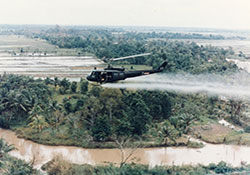Office of Research & Development |
 |

VA Research Currents archive
Posted July 16, 2013
(Summer 2013 VA Research Currents)

The U.S. military sprayed more than 19 million gallons of Agent Orange and other herbicide combinations during "Operation Ranch Hand" in the Vietnam War.
New VA research has linked Agent Orange exposure to fast-growing prostate tumors. (Photo: U.S. Army)
Related article: Veteran sells photos to raise funds for VA research
As in his Marine days, Sam Collins is a fighter. He has an aggressive form of prostate cancer that has now come back three times—even after a variety of treatments—but he is not giving up hope.
"The Marine Corps taught me that you keep on fighting. So I keep going," says the 63-year-old Missouri man.
According to VA policy, Collins, as a Vietnam Veteran, is presumed to have been exposed to the herbicide Agent Orange. Prostate cancer is one of several diseases linked to the herbicide, which contained toxic chemicals called dioxins.
Now, new study data show that Veterans exposed to Agent Orange are not only at higher risk for prostate cancer, but they are more likely to have aggressive forms of the disease—like that affecting Collins. The study appears in the July 1 issue of the journal Cancer.
The study, conducted at the Portland VA Medical Center and Oregon Health and Science University, was based on the records of 2,720 VA patients who had undergone an initial prostate biopsy. Biopsies are usually ordered after abnormal results from a digital rectal exam or prostate-specific antigen (PSA) blood test.
Prostate cancer was diagnosed in a third of the Veterans. The chance of finding cancer was 52 percent higher in those whose records indicated Agent Orange exposure.
Among all the men biopsied, one in six had high-grade, or fast-growing, disease. Exposure to Agent Orange did not raise the risk of low-grade prostate cancer, but it raised the risk of high-grade disease by 75 percent. In fact, exposure to the herbicide doubled the risk of the highest-grade, most life-threatening cancers—those with the highest Gleason scores. Gleason scores are based on the degree of abnormality seen in prostate cells under a microscope.
Another finding from the study: Men who had been exposed to Agent Orange tended to be about five years younger at the time of biopsy than non-exposed Veterans. The researchers say this is another sign of faster-growing cancer.
Senior study author Mark Garzotto, MD, says Agent Orange status could be a valuable piece of information to factor into screening and treatment decisions.
Experts have debated whether all men should be routinely screened for prostate cancer. Critics say current screening methods often lead to false positives—suggestions of cancer where none exists—and in many cases find slow-growing cancers that would be unlikely to cause any symptoms during a man's life. Nonetheless, men with these slow-growing cancers may still undergo treatment and incur serious side effects. Also, once a cancer is detected, men face tough choices over how aggressively to treat it. One option in early-stage disease is to just closely monitor the tumor, but many patients worry that this may allow their untreated cancer to spread.
"Having a means of specifically detecting life-threatening cancer would improve the effectiveness of screening and treatment of prostate cancer," notes Garzotto. He says screening Agent Orange patients is important because it would help zero in on high-grade prostate cancers—those most likely to be lethal. "For these men," he says, "therapy results in a significant improvement in survival and reduction in the spread of cancer to the bones."